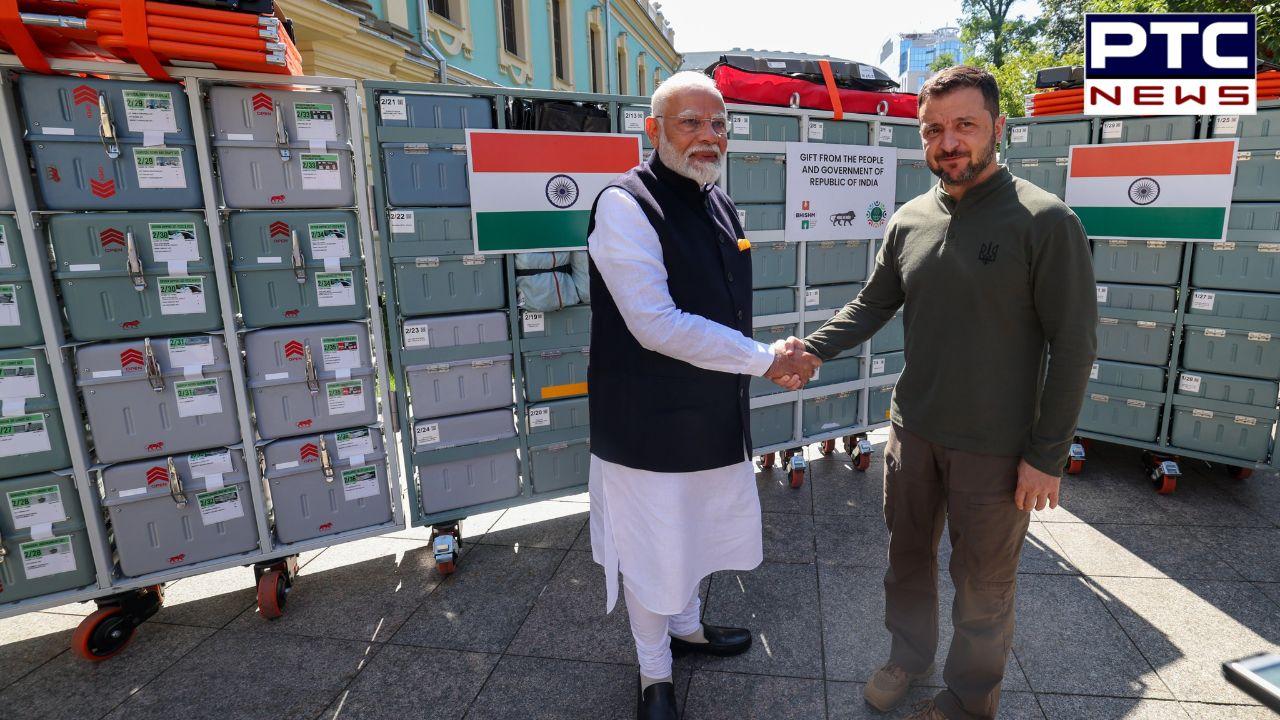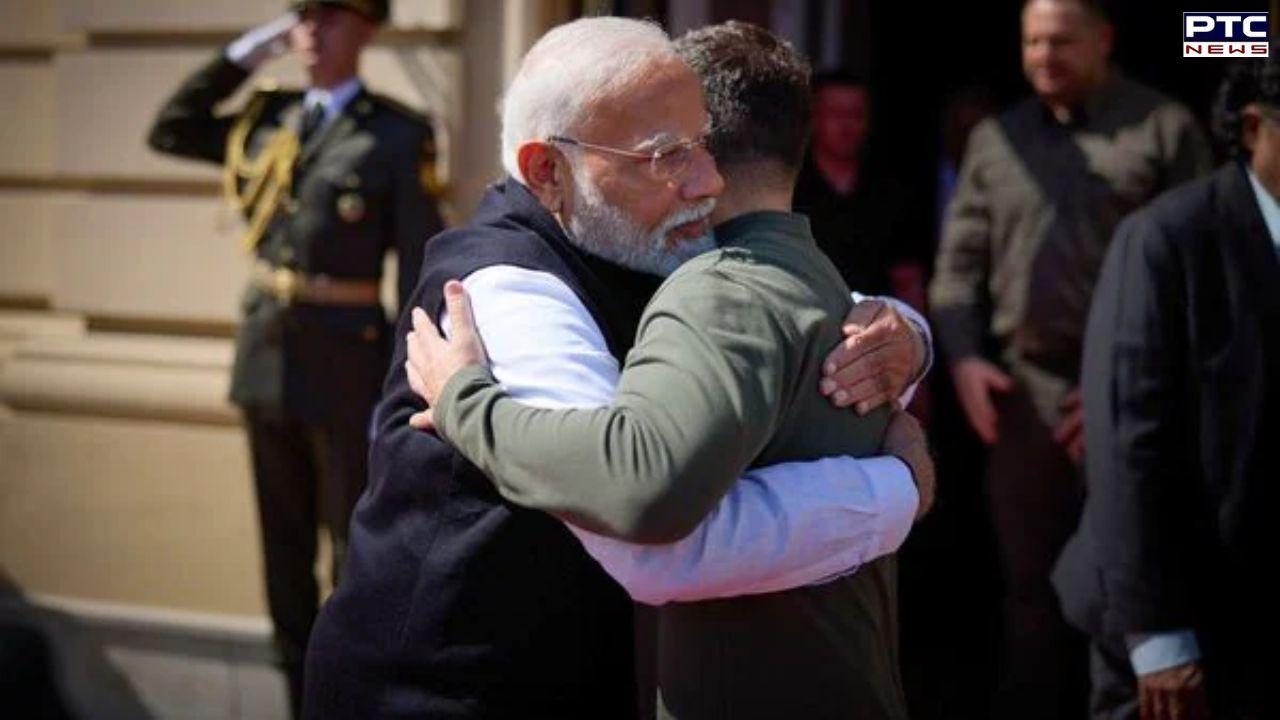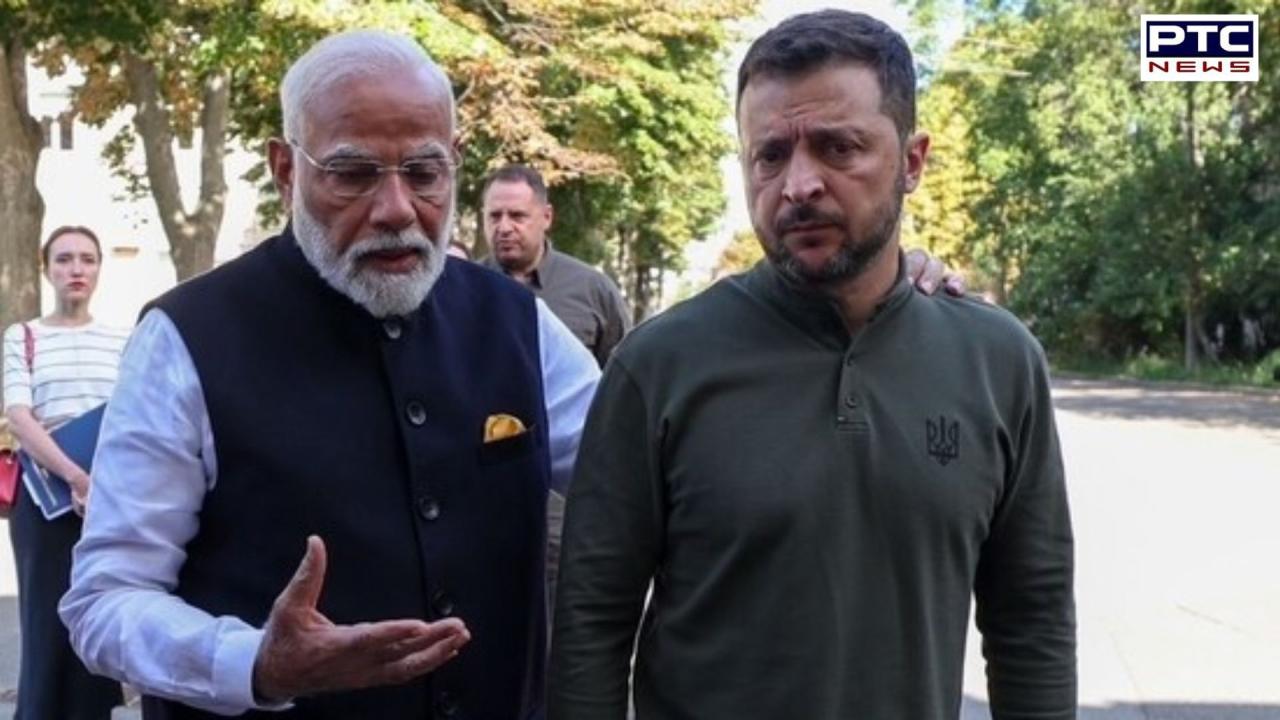PM Modi says 'Peace is our side'; Zelenskyy urges India to support Ukraine | Key highlights from Ukraine visit
PM Modi’s visit to Ukraine comes just weeks after his high-profile trip to Moscow, where he held extensive talks with Russian President Vladimir Putin
PM Modi Ukraine visit: In a significant and historic diplomatic engagement, Prime Minister Narendra Modi met Ukrainian President Volodymyr Zelenskyy in Kyiv on Friday, marking the first visit by an Indian Prime Minister to Ukraine since the country’s independence from the Soviet Union in 1991. The visit comes amid the ongoing Russia-Ukraine conflict. India reaffirmed its stand for peace in Ukraine's ongoing conflict with Russia, while Zelenskyy urged New Delhi to fully support Ukraine, asking it to avoid a "balancing act."

Key highlights from PM Modi's Ukraine visit
A warm reception in Kyiv
PM Modi’s arrival in Kyiv was marked by a warm reception from the Indian diaspora, who greeted him with chants of “Bharat Mata ki Jai” as he arrived at his hotel around 7:55 am local time. The Prime Minister shared moments from his visit on social media, expressing gratitude for the enthusiastic welcome. His visit to the war-torn nation is seen as a crucial step in India's ongoing efforts to balance its diplomatic relationships with both Russia and Ukraine, while advocating for a peaceful resolution to the conflict.
Tribute to Mahatma Gandhi and call for peace
One of the key moments of PM Modi’s visit was his tribute to Mahatma Gandhi. At a statue dedicated to the global peace icon, PM Modi laid floral tributes, reiterating India’s position on global conflicts. “This is not an era of war; it is a time to come together to tackle the challenges that threaten humanity,” PM Modi said, emphasising the need for unity and cooperation in the face of global challenges.
One-on-one talks and Zelenskyy’s appeal
The crux of PM Modi’s visit was the one-on-one talks with President Zelenskyy. In a press conference following their meeting, PM Modi reiterated India’s neutral stance in the conflict, while also offering India’s help in efforts to end the war. He said New Delhi was ready to make proactive contributions toward peace, reinforcing India’s commitment to being a part of the solution rather than taking sides in the conflict.
However, President Zelenskyy had a more direct message. He urged India to align itself more closely with Ukraine, rather than maintaining a balancing act between Kyiv and Moscow. “India has begun to recognise that this is not just a conflict; this is a real war of one man and his name is Putin against the whole country whose name is Ukraine. You are a big country. You have a big influence, and you can stop Putin and halt his economy, and put him really in his place,” Zelenskyy stated, highlighting Ukraine’s desire for stronger support from India.

Bilateral agreements and strengthened ties
A significant outcome of the visit was the signing of four bilateral agreements between India and Ukraine. These agreements, which cover cooperation in agriculture, medicine, culture, and humanitarian assistance, signal a strengthening of ties between the two nations. The agreements are expected to pave the way for deeper collaboration in these sectors, further solidifying India’s role as a supportive partner to Ukraine.
Energy trade and strategic diplomacy
The discussions between the two leaders also touched upon India’s energy trade with Russia, a topic that has been a point of contention in the international arena. External Affairs Minister S Jaishankar confirmed that this issue was raised during PM Modi’s meeting with President Zelenskyy. India's continued trade with Russia, especially in the energy sector, has been crucial for New Delhi, providing economic benefits in the form of discounted crude oil. However, this has also drawn criticism from Western nations that have imposed sanctions on Moscow.

Humanitarian aid: BHISHM Cubes
In addition to diplomatic discussions, PM Modi’s visit included a significant humanitarian gesture. The Prime Minister presented four BHISHM (Bharat Health Initiative for Sahyog Hita and Maitri) Cubes to the Ukrainian government. These cubes, which contain medicines and equipment for first-line care in various medical situations, reflect India’s commitment to providing tangible support to Ukraine during the ongoing conflict. The BHISHM Cubes are designed to assist with immediate medical needs, highlighting India’s role in supporting the Ukrainian people during these challenging times.
Background and previous engagements
PM Modi’s visit to Ukraine comes just weeks after his high-profile trip to Moscow, where he held extensive talks with Russian President Vladimir Putin. This visit was met with criticism from Western nations and Ukraine, especially as it coincided with a Russian strike on a children’s hospital in Kyiv. Despite the backlash, PM Modi has remained steadfast in India’s stance, calling for dialogue and diplomacy as the path to peace.
Earlier this year, PM Modi also met with President Zelenskyy on the sidelines of the G7 summit in Italy. During that meeting, he emphasised that India would continue to do everything within its means to support a peaceful resolution to the Ukraine conflict.